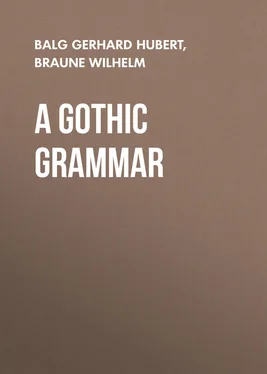waúrms, wurm ; haúrn, horn ; baúrgs(OHG. burg), city ; waúrd, word ; waúrpum, prt. pl. of waírpan, to throw (cp. § 32); saúhts(OHG. suht), sickness ; daúhtar, daughter ; aúhsa, ox ; taúhum, prt. pl. of tiuhan, to pul ; baúhta, prt. of bugjan, to buy .
Note 1. aúbefore other sounds is entirely exceptional and sumwhat doutful. Thus, in auftô, perhaps (onse also ufto; Mt. XXVII, 64), bisauljan, to sully ; bisaulnan, to becum sullied . Holtzmann (altd. gr., p. 14) regards also ufbauljan(II. Tim. III, 4) as belonging to this class.
Note 2. The change of short uinto aúbefore his without exception. An apparent exception is the enclitic -uh, and , the uof which must be referd to a secondary development; it is never found after a short accented vowel, nor after a long vowel or difthong; e. g., sa-h, ni-h, þai-h, wiljáu-h, ƕarjanô-h; uoccurs after consonants, and in polysyllabic words in which a final short abefore the uwas elided; as, ƕaz-uh, þammuh(= þamma uh), qiþuh(= qiþa uh). Sum, however, assume -ûh(cp. Beitr. 18, 299). – Other us before har all long: þûhta(cp. § 15). – There ar a few cases of ubefore rin unaccented syllabls ( § 13, n. 1), namely in the foren words spaikulâturand paúrpura(beside paúrpaúra), purpl ; so, also, in the Gothic fidur-( § 141, n. 1) which, however, stands perhaps for fidûr-(cp. IF. 4, 334). – The prefix ur-(in urreisan, urruns, etc.) does not belong here; it is a late form for usthe sof which was assimilated to a following r( § 78, n. 4).
Note 3. Not every aubefore hand rhas developt from u, but may also be the difthong au; as, háuhs, high ; táuh, prt. of tiuhan(but pl. taúhum, § 31); gáurs, sorry (cp. OHG. gôrag, wreched , and Goth. gaunôn, to mourn ).
Note 4. The aufor uin the endings of the u-declension may be aú, but also áuwhich would be due to confusion caused by analogy. Beitr., 18, 280. – Cp. also uftôfor auftô, § 24, n. 1.
Note 5. As a rule, the Greek ο is represented by aú; e. g., apaustaulus, ἀπόστολος; alabalstraun, ἀλάβαστρον; Barþaulaumaius, Βαρθολομαῖος; Pauntius, Πόντιος; aú= υ in Saúr, Σύρος; paúrpaúra, πορφύρα. – Goth. aú= o in the East Gothic name Thorisa. (Wrede, 'Ostg.', 76. 165).
§ 25. II. The old difthong au[= ou in E. house]. Every aunot broken from u(before h, r; s. § 24and note 3) is a difthong; it corresponds to OHG. au, ou, or ô (ahd. gr., §§ 45. 46), OS. ô, ON. au. Whenever it is likely to be confused with aú, we put (according to Grimm), an accute accent over the a( áu). E. g.
The prts. sg. of the II. ablaut-series ( § 31): gaut, I pour (inf. giutan); laug, I lied , etc.; laugnjan, to deny ; daupjan, to baptize ; galaubjan, to believ ; galaubeins, belief ; rauþs, red ; dauþus, deth ; — aukan, to increase ; hlaupan, to run ; stautan, to push, strike ; — haubiþ, hed ; augô, ey .
auin inflections and final occurs in the u-declension: sunaus, sunau; 1st pers. sg. opt.: nimau, nêmjau; 3d pers. sg. imper.: lausjadau; opt. midl: haitaidau.
Note 1. auoften interchanges with aw(cp. § 42); e. g., taujan, prt. tawida, to do ; mawi, gen. maujôs, girl ; sniwan, prt. snau, to hasten .
Note 2. Latin writers express Goth. auby au; as, Ausila, Austrovaldus, Audericus. Cp. Wrede, 'Wand.', 96 et seq. Concerning East Gothic monofthongizations, s. Wrede, 'Ostg.', 165 et seq. (Zs. fda., 36, 2732).
Note 3. In the u-declension uis often found for áu; cp. § 24, n. 4; § 105, n. 2.
§ 26. Another au, historically, and probably also fonetically, different from the preceding ones occurs before vowels.
(a) For original ô: stauida, prt. of stôjan, to judge ; staua, f., judgment ; staua, m., judge ; taui, n., gen. tôjis, deed (cp. also ubiltôjis, evil-doer ; taujan, to do , prt. tawida); afmauidaiand afdauidai, pps. of *afmôjan, and *afdôjan, to tire out, weary ; sauil, n., sun .
(b) For û in the other Germanic languages: trauan(OHG. trûên), to trust ; bauan(OHG. bûan), to dwel ; bnauan, to rub ( to pieces or powder . ON. (g)núa, OHG. nûan). Cp. also § 179, n. 2.
Sinse this audoes not change into awbefore vowels, it must denote a monofthong which is likely to be the long of aú, hense a long open o(= a in E. fall), while long close o(shading very much to û, like ô in E. home) is denoted by ô. Accordingly, Goth. antevocalic ô, ûpast into au. Cp. Brgm., I, 156. For the extensiv literature on this question, s. Noreen's 'Urgerm. Lautlehre', p. 34; also Beitr., 17, 563-567.
Note 1. Also Gr. ω before a vowel, which is represented as a rule by ô, is renderd by au: Trauada, Τρῳάς; Nauêl, Νωέ; Lauidja, Λωίς.
Note 2. ôbefore uoccurs, however, in the preterit forms waiwôun(inf. waian, § 182), lailôun(inf. *lauan, § 179, 4). Cp. Beitr., 11, 742.
Читать дальше











